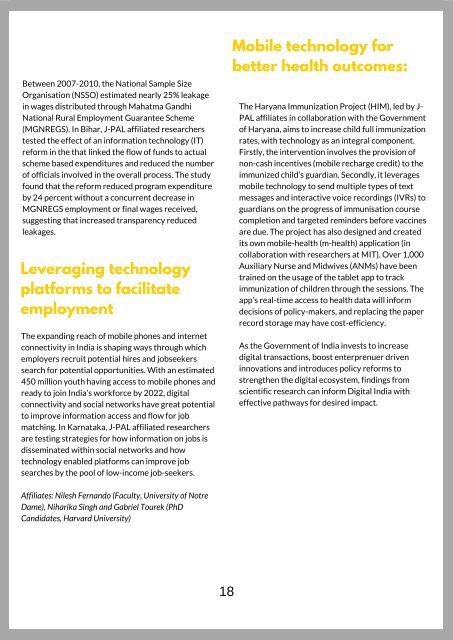Create successful ePaper yourself
Turn your PDF publications into a flip-book with our unique Google optimized e-Paper software.
Between 2007-2010, the National Sample Size<br />
Organisation (NSSO) estimated nearly 25% leakage<br />
in wages distributed through Mahatma Gandhi<br />
National Rural Employment Guarantee Scheme<br />
(MGNREGS). In Bihar, J-PAL affiliated researchers<br />
tested the effect of an information technology (IT)<br />
reform in the that linked the flow of funds to actual<br />
scheme based expenditures and reduced the number<br />
of officials involved in the overall process. The study<br />
found that the reform reduced program expenditure<br />
by 24 percent without a concurrent decrease in<br />
MGNREGS employment or final wages received,<br />
suggesting that increased transparency reduced<br />
leakages.<br />
Leveraging technology<br />
platforms to facilitate<br />
employment<br />
The expanding reach of mobile phones and internet<br />
connectivity in India is shaping ways through which<br />
employers recruit potential hires and jobseekers<br />
search for potential opportunities. With an estimated<br />
450 million youth having access to mobile phones and<br />
ready to join India’s workforce by 2022, digital<br />
connectivity and social networks have great potential<br />
to improve information access and flow for job<br />
matching. In Karnataka, J-PAL affiliated researchers<br />
are testing strategies for how information on jobs is<br />
disseminated within social networks and how<br />
technology enabled platforms can improve job<br />
searches by the pool of low-income job-seekers.<br />
Mobile technology for<br />
better health outcomes:<br />
The Haryana Immunization Project (HIM), led by J-<br />
PAL affiliates in collaboration with the Government<br />
of Haryana, aims to increase child full immunization<br />
rates, with technology as an integral component.<br />
Firstly, the intervention involves the provision of<br />
non-cash incentives (mobile recharge credit) to the<br />
immunized child’s guardian. Secondly, it leverages<br />
mobile technology to send multiple types of text<br />
messages and interactive voice recordings (IVRs) to<br />
guardians on the progress of immunisation course<br />
completion and targeted reminders before vaccines<br />
are due. The project has also designed and created<br />
its own mobile-health (m-health) application (in<br />
collaboration with researchers at MIT). Over 1,000<br />
Auxiliary Nurse and Midwives (ANMs) have been<br />
trained on the usage of the tablet app to track<br />
immunization of children through the sessions. The<br />
app’s real-time access to health data will inform<br />
decisions of policy-makers, and replacing the paper<br />
record storage may have cost-efficiency.<br />
As the Government of India invests to increase<br />
digital transactions, boost enterprenuer driven<br />
innovations and introduces policy reforms to<br />
strengthen the digital ecosystem, findings from<br />
scientific research can inform Digital India with<br />
effective pathways for desired impact.<br />
Affiliates: Nilesh Fernando (Faculty, University of Notre<br />
Dame), Niharika Singh and Gabriel Tourek (PhD<br />
Candidates, Harvard University)<br />
18


